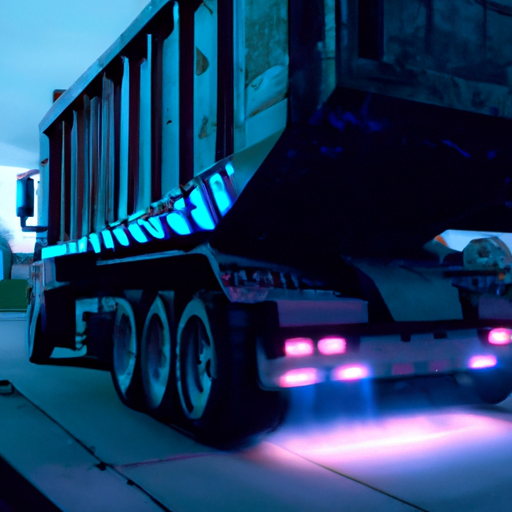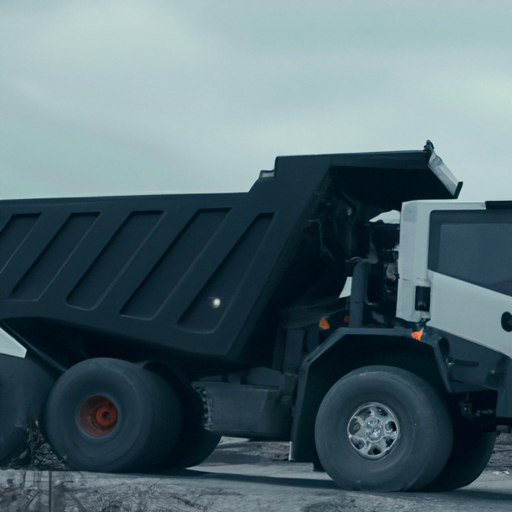-
Table of Contents
Introduction

The future of dump trailers is set to transform due to several anticipated advancements in technology, materials, and design. As the demand for efficient waste management increases alongside environmental sustainability concerns, expectations are high for improvements that will optimize their functionality and longevity. This introduction explores potential developments such as autonomous operation systems, lightweight but robust materials that increase fuel efficiency and load capacity; additionally incorporating smart technologies for real-time tracking and predictive maintenance could change how these vital logistics tools operate. The discussion on what to expect from the future of dump trailers indeed opens a window into an exciting era of innovation within this industry.
Innovations in the Future of Dump Trailers: What to Expect
As 21st-century technology continues to evolve and expand, the sphere of dump trailers is certainly not being left behind. The future of dump trailers looks exciting, with new innovations in construction, design and software promising to revolutionize the industry. A shift towards smarter operations coupled with more effective designs are set to redefine how businesses operate day-to-day.
First things first: it’s time for a bit of an upgrade when it comes down to construction materials. Modern engineering professions have begun dabbling with high-strength steel as an alternative material for trailer constructions – particularly where durability is crucial at larger scales. High strength steel has been recognized for its remarkable yield strength without compromising flexibility or weight-efficiency aspects, making it ideal for heavy-duty applications like dump trailers.
Sustainability also emerges as a critical principle guiding these advancements. Eco-friendly options such as solar-powered components have started gaining traction in recent years. Think about this – instead of idle fuel-consumption while loading or unloading cargo; solar energy could power electric motors to perform these functions much efficiently and sustainably! Imagine the reduction in carbon footprint if every one of our thousands of dump trucks made that switch!
Moreover, increased use efficiency will be facilitated by developments across telematics systems, allowing companies enhanced control over their fleet’s operational performance metrics – everything from load management right through driver behavior monitoring just got easier-to-track than ever before!
Envision smarter trailers equipped with sensors throughout their chassis communicating real-time updates on conditions like tire pressure levels or structural integrity back over wireless networks straight into central command centers—radical breakthroughs boosting safety standards across boardrooms worldwide.
Then there’s autonomous operation —a buzzword that has been capturing attention everywhere from Tesla cars right up
to Amazon delivery drones—and now seems poised ready take center stage within trucking industry too soon enough!
Artificial intelligence (AI) capabilities paired up alongside machine learning algorithms promise major impacts upon today’s driving landscapes. Think about it – automated systems flawlessly navigating routes, effortlessly handling tough terrains, and eliminating human error completely!
Plus, by freeing up drivers from mundane tasks such as navigation and manual operations, AI allows them to focus on more critical functions such as ensuring the safety of their cargo and other vehicles on the road alongside strategic decision-making roles that computers still can’t replicate.
However exciting these developments may be though, we mustn’t overlook very real challenges that lie in implementing these innovations. Questions around technology’s reliability under diverse operating conditions or potential cybersecurity risks need addressing before widespread adoption is possible but rest assured—our brightest minds have been working tirelessly over creating solutions for same.
In summing up – the future of dump trailers holds much promise with dashes of high-strength steel constructions coupled with sustainable energy sources boosting not just durability but also eco-friendliness across operations world-wide. Smart telematics enables better fleet management while autonomous driving opens new realms within operator productivity; all together setting scene for a revolution within industries everywhere soon enough!
The future looks bright indeed for dump trailers – a future filled with innovation aimed at increasing efficiency, improving safety standards and promoting sustainability like never before…and it’s coming sooner than you may think.
Navigating the Future of Dump Trailers: Expected Changes and Advances
With the evolution of technology and an increasing focus on efficiency, it’s safe to say that we’re standing at the dawn of a new era for dump trailers. The industry is bracing itself for some remarkable changes—innovations that will redefine how operators utilize these vehicles while also making their jobs significantly easier.
Firstly, let’s delve into the concept of automation. It has already transformed numerous sectors and industries worldwide, offering superior precision and reliability over manual operations. In terms of dump trailers, experts are predicting that automated loading protocols might come into play shortly which could drastically reduce human error during loading processes.
Imagine this: instead of relying solely on manual calculations or estimations for optimal load weight distribution, you have state-of-the-art sensors integrated directly into your trailer bed. These sensors would provide real-time data regarding weight distribution across your entire payload instantly; allowing you to adjust accordingly before it becomes a problem potentially saving thousands in damage repair costs or even preventing accidents.
A significant advancement under development is smart onboard computer systems designed explicitly for dump trailer operations. Such advanced AI-based platforms can anticipate potential issues based on patterns recognized through machine learning algorithms from historical functioning data.
Moreover, fuel efficiency continues being a central concern with any heavy-duty vehicle operation – including dump trucks – such enhancements like aerodynamic modifications are getting more attention. Manufacturers are inclined towards crafting designs focusing less wind resistance and hence investing less energy moving against air friction saving both fuel cost along with reducing environmental footprints.
The other exciting development comes in the form of fully electrically powered dump trailers—an innovation sparked by our collective shift toward green energy sources worldwide as part effort combating climate change impact caused primarily due burning fossil fuels like diesel traditionally used power these machines’ massive engines.
Despite currently being relatively expensive compared to their diesel counterparts due high battery costs associated manufacturing phase – there’s hope prices should decrease intending match those conventional models within next few years thanks ongoing research better economical alternatives existing Lithium-ion batteries. These electric dump trailers not only promise zero emissions but also remarkably low noise levels, which can be a significant advantage in urban or residential areas where stringent noise regulations are often imposed.
Last but certainly not least is the integration of improved safety features like advanced driver-assist systems – including enhanced brake systems, collision warning technology, and even camera-based blind-spot monitoring. With such innovations becoming more commonplace in consumer vehicles today, it’s no surprise that these tools will soon find their way into heavy-duty industrial applications as well.
In conclusion, we’re heading towards an efficient future with bold technological advancements set to revolutionize how we view and operate dump trailers—a move toward safer operations, improved efficiency eliminating unnecessary costs along environmental sustainability within this sector paramount importance maintaining our planet’s health years come.
While some of requirements might seem little far-fetched right now given current limitations both technology cost perspective – industry experts remain optimistic changes mentioned above definitely horizon just matter when rather if they’ll become reality.
As always remember keep eyes open never stop exploring possibilities ahead because who knows what exciting innovations tomorrow may bring?
What to Expect in the Evolution and Future of Dump Trailers
Title: The Future of Dump Trailers: What to Expect
The world is moving quite swiftly towards a future that drastically deviates from our traditional ways. Automations, digitizations, and other technological advancements are taking the front seat across various industries. One such industry experiencing this progressive wave is the dump trailer industry.
Dump trucks or trailers have been an indispensable part of construction, mining and waste management projects for decades. With their heavy-duty structure designed for carrying bulk materials like sand, asphalt, snow, gravel or demolition debris over significant distances efficiently – they’ve formed the backbone of industrial logistics. But as we march ahead in time embracing innovative technologies at every turn, it’s worth anticipating what transformational changes these vehicles would undergo too.
One noteworthy prediction about dump trailers’ future revolves around the environment-friendly shift that all sectors of society have begun to appreciate strongly – Electric Vehicles (EVs). Indeed EVs are no novelty anymore; however integrating them within disposal systems can revolutionize how transport-related pollution levels could be controlled extensively. It’s not just conjecture either; several big names in automotive manufacturing already plan on introducing electric variants of traditionally gas-powered work vehicles like dump trucks.
Now consider pairing this “electric” concept with automation technology – another emerging trend shaping numerous fields currently including transportation applications like self-driving cars. An autonomous driving system integrated into dump trailers holds immense potential to improve safety measures exponentially by minimizing human error incidents and ensure smoother functioning at worksites round-the-clock without any fatigue concerns that usually accompany manual operations.
Dispensing off material from its rightful place has always been challenging considering factors like space constraints & angle complexity hence imagining an AI-run mechanism capable enough to execute precision dumping exactly where needed sounds promising both in terms of efficiency & productivity boost-ups!
If we delve further into anticipatory tech solutions influencing commercial vehicle designs then telematics might be a game-changer! Having real-time tracking capabilities along with essential data monitoring within dump trailers would allow comprehensive control over cargo transport operations. From tracking vehicle location, analyzing fuel consumption patterns to anticipating maintenance needs – telematics can provide all such essential insights just at the push of a button! This could translate into cost savings due to decreased downtime and enhanced operational efficiency.
Despite these futuristic visions being predictive in nature as of now, they’re not entirely far-fetched seeing advancement pace we’ve been witnessing consistently. The industry pioneers like Caterpillar & Volvo have already begun testing hybrid electric or automated versions respectively indicating that an era where “smart” dump trailers become commonplace is perhaps nearer than it seems!
However adopting these transformations won’t be without challenges – from infrastructural upgrades needed for supporting EVs, creating reliable autonomous systems capable of navigating complex terrains to ensuring data security within integrated telematic structures- overcoming them would need substantial resource allocation & strategic planning.
Conclusively though, technological evolution has always pushed boundaries uncovering novel possibilities previously unthought-of! Hence looking through the prism of innovation one might say that future is indeed promising for the evolving world of dump trailers making them more efficient, eco-friendly and smart than ever before promising us a safer and sustainable environment. So here’s welcoming what lies ahead with open arms while cherishing how far this humble industrial workhorse has come across history!
Q&A
- Question: What technological advancements can we expect in the future of dump trailers?
Answer: Future dump trailers might incorporate advanced technologies such as automated loading and unloading systems, GPS tracking for precise location monitoring, and smart systems that provide real-time updates on the trailer’s condition. - Question: Will sustainable practices impact the future of dump trailers?
Answer: Yes, sustainability will play a crucial role in shaping the future of dump trailers. This may include developing models that use alternative fuels or electric power to reduce emissions and implementing designs with recyclable materials. -
Question: How could market demand affect the evolution of dump trailers in the coming years?
Answer: Market demand is expected to drive innovation in size, capacity, durability, and maneuverability of these vehicles based on industry requirements which include construction, mining or waste management sectors among others.
Conclusion
In conclusion, the future of dump trailers is likely to be characterized by technological advancements enhancing efficiency, safety and capacity. Innovations such as automated loading/unloading systems, GPS tracking for optimized route planning, and enhanced materials to increase durability can be expected. Furthermore, developments in hydraulics and electric power may contribute to more environmentally-friendly dump trailers. Overall, advancement will continue creating smarter, safer and more efficient dump trucks while reducing their environmental impact.

